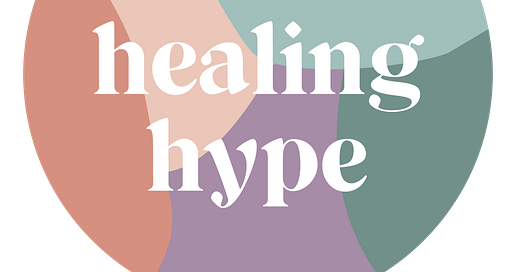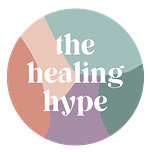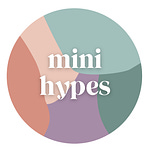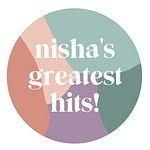Did you know that you could try out The Healing Hype community for FREE for 30 days? Just click the button below to get access to healing circles, workshops, and the advice column. ALSO, I’m planning to add more to The Healing Hype community. The price you pay now will be locked in forever! That means you will get access to more, for less. So try it out today to see if it’s right for you. There’s no obligation, and you can cancel at anytime.
I’m going to stop making promises about exactly what I’m writing about next here. For me to talk and write about something well, I have to truly be inspired. I always want to give you my authentic perspective. So I can promise that I will talk about self-abandonment in a future post, but the timing will be TBD :)
In the beginning…
I was in a beautiful Clubhouse room with Lauren Elizabeth, a compassionate and curious justice-informed business coach, where we talked about imposter syndrome.
I actually did an IGTV called “Imposter Syndrome is the Imposter, Not You!” back in July. And I talk about how a colleague and friend of mine, Nikki Andrews, wrote about imposter syndrome as related to librarianship, however, a lot of it can be applied in any context. What is incredible, is that the researchers who coined the term in 1978 were incredibly misogynistic in their description of how women use their “friendliness, charm, looks, humor, sexuality, and perceptiveness” to win people over; they discuss this in the context of women seeking validation and mentorship. Andrews astutely concludes that many of these qualities are also known to be empathy, something that requires a lot of emotional labor. Additionally, the article completely ignores institutional sexism and racism, especially in academia.
My point is that imposter syndrome isn’t often discussed in the context of systems, it’s usually seen as an individual problem. And then these individual problems are somehow devoid of oppressive structures. Does this feel weird to you too?
What does being an “imposter” feel like?
As someone who has had multiple careers, the feeling of being an imposter is a familiar one. Ever since I was little, I struggled to answer the innocuous (but actually harmful IMO) question, “What do you want to be when you grow up?” As a child, I internalized this question as a destination I needed to reach like: THE FUTURE WHEN I COULD FINALLY BE WHAT I WANTED.
But that was the problem. I felt like there was some mythical passion or career out there that was waiting for me, I just had to figure out what it was. I went to all the career counselors and took all the tests and still jumped around experimenting. I’m glad I tried new things, but the process that made me jump around came from a feeling of lack, not fullness.
So how does being an imposter feel? It feels like I know some things but not enough. It feels like I need to carry more weight. It feels like I’m small and will never be big enough. It feels like I’ll never get it right.
It doesn’t feel good.
Enough is enough with this not enoughness! Who told us this? Who taught us this? Rather, what ideology encourages this?
It’s capitalism tho…
Is it always capitalism’s fault? I mean…yes? I will never say it’s the one and only thing, but to not question the ideas that exist within a global and pervasive economic system that has direct implications about class and resources and clear implications for race, gender, and ability, would just be silly.
For capitalism to exist, competition needs to exist. This creates a rush to do better and be better. If we just accepted who we were, capitalism would have nothing to sell us, would it?
If we just take this class online and get this degree and exercise 5 times a week (with these exercise programs) and get on this diet, everything will be great!
The fact is that the land gives us everything we need, and we have created all these solutions in reaction to the system that created the need for these solutions. You can call it ironic, or you can admit that it was designed this way.
In the same vein, capitalism asks us to be hyperindividualistic. It says that you and you alone need to have it all figured out. It asks us to compete. We start comparing ourselves to others. For me, it started with grades and how smart I was. I’ll never forget the timed math quiz I took in first grade where I got one question wrong after always getting 100%. I still swear that the teacher called time early on purpose! Yes, as children we are a bit more ego-driven, but we are also caring and empathetic. The academic system is, of course, going to cater to capitalism because that is where it delivers us. Grades turn into resumes, resumes turn into bigger resumes, which turn into LinkedIn profiles, and so on. The value of community is not measured.
We all have different roles to play.
Lauren mentioned something during the Clubhouse conversation that really resonated with me on multiple levels. We all have different roles to play. We don’t have to be great at everything. We don’t even have to be good at everything. It’s okay to hype up your gifts, admire those who have other gifts, and laugh at your imperfections. Because that means you’re a human being. And that also means you can collaborate with others who have similar and different gifts as you.
She also mentioned Deepa Iyer’s Social Change Ecosystem map from the Building Movement Project, which I learned about through a workshop I attended about understanding your role in activism with Irene Morning and Margeaux Feldman. Between going through this exercise and diving into Human Design, I feel so confident IN my imperfections. And I’m eager to meet others who complement me instead of feeling like I have to be in a competition with them. And if there’s something I really admire about someone else, I try to embody it in my own way, not their way.
We all have something to give to each other. We are not imposters, we are divinely created beings who evolve. And we evolve even better with community support. When we are only out for ourselves and calling ourselves names like “imposter”, we are making ourselves small instead of expanding what we already have. Trying to stop being an imposter means erasing who we are in that moment. This comes from a deficit mindset.
And the funny thing is that the places we don’t feel enough are actually beautiful and tender places that give us wisdom. They are the shadows that we can nurture out of love, not punishment.
The more we accept ourselves and meet ourselves where we are at, the less we realize we need to reach for the elusive “more….or else”. Or else what? Or else you’ll keep thinking you’re not enough when you are whole part of a whole universe?
A bird flies because it has that gift. A tree stays rooted because it needs roots to survive. It reaches out for the sun for survival too. But does the tree try to fly away? Or does it try to have long and beautiful branches for birds to make a nest and take rest?
Community over competition
Forget imposter syndrome. Well…maybe don’t forget it. But acknowledge how it is trying to play you. Professions are created. Yes, professions have functional purposes, but the values, certifications, and advancement of many professions are created to serve problematic systems. Professionalism itself seems to want to delineate itself from being too “personal” - I write about this here. Do we want to put ourselves in a box or do we want to be ourselves, full out?
When we take a look at a community where people have different roles and needs are fulfilled based on love and reciprocity, we start to see that “need” is relative. We notice we already have enough, and the rest can just be expansive imagination. We can ask for help, we can reach out to someone else who is safe, and we can build ourselves up instead of tear each other down.
Have you ever teared up watching one of those videos where a couple writes their wedding vows to each other and reads them out loud? I have. What affects me the most is the radical acceptance each person has for each other. They know they are both imperfect, and they still relish in their unity.
In the end…
When someone first brought up imposter syndrome to me, I completely related. I didn’t say this out loud, but I might as well have: “Wait, you don’t feel like you’re enough too?”
We are humans who cannot do everything and we wish we could, and this has been pathologized into “imposter syndrome.”
Maybe a job or hobby or whatever isn’t right for you. That’s okay! It doesn’t mean you’re an imposter, it means you’re trying to find your way in the world.
Give yourself grace. Feed yourself compassion. And remember that, at minimum, I’m here to remind you that you don’t have to do it all alone. I promise you, you are enough.
And also, watch this TikTok video :)










Share this post